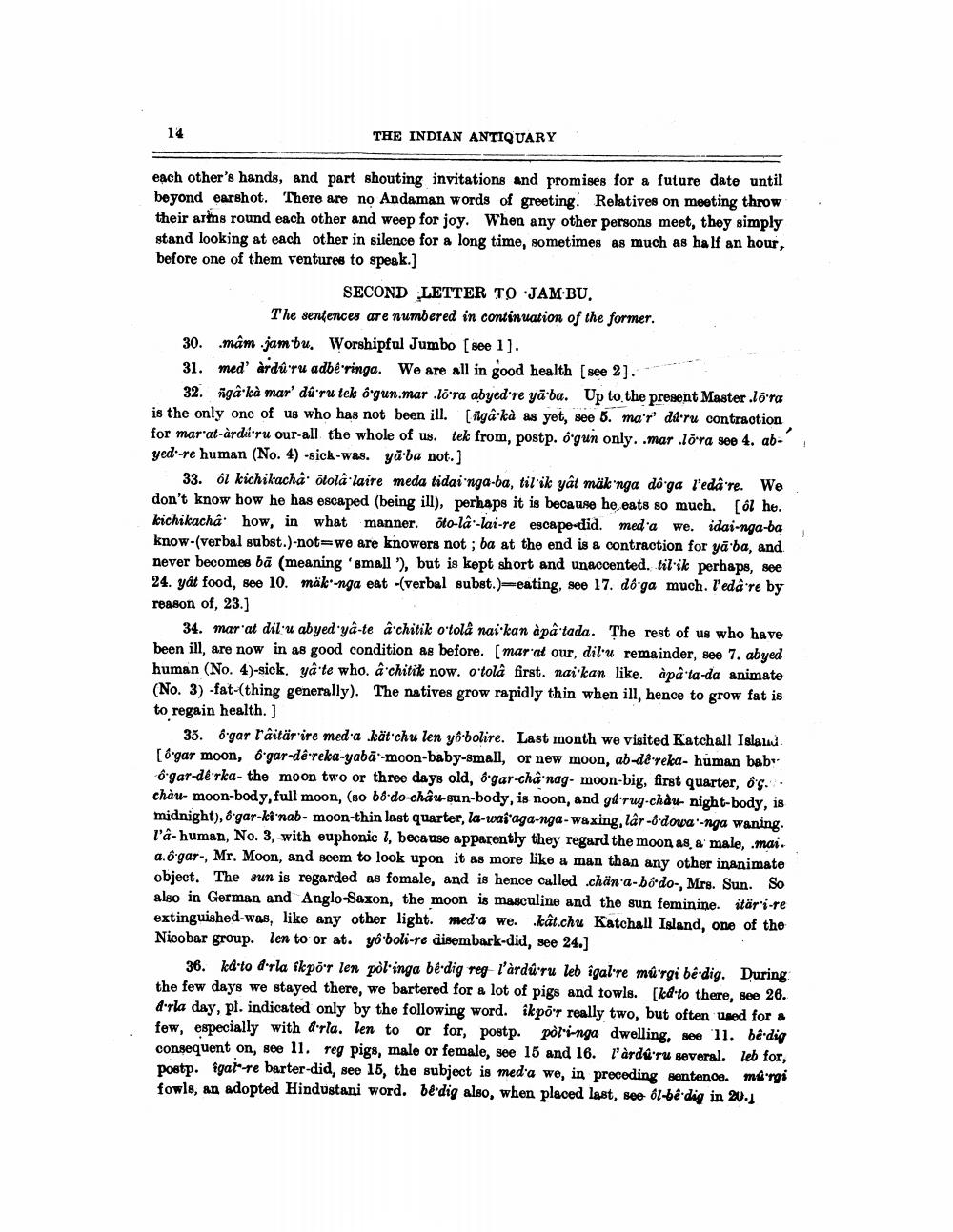________________
14
THE INDIAN ANTIQUARY
each other's hands, and part shouting invitations and promises for a future date until beyond earshot. There are no Andaman words of greeting. Relatives on meeting throw their arms round each other and weep for joy. When any other persons meet, they simply stand looking at each other in silence for a long time, sometimes as much as half an hour, before one of them ventures to speak.]
SECOND LETTER TO JAM BU
The sentences are numbered in continuation of the former.
30. mâm jambu. Worshipful Jumbo [see 1].
31. med' àrdûru adbé ringa. We are all in good health [see 2].
32. nga kà mar' dûru tek o'gun.mar lo'ra abyed're ya ba. Up to the present Master .lo'ra is the only one of us who has not been ill. [ñgâ'kà as yet, see 5. ma'r' daru contraction for mar at-àrdiru our-all the whole of us. tek from, postp. o'gun only. .mar .lora see 4. abyed-re human (No. 4) -sick-was. yaba not.]
33. ôl kichikacha otolâ laire meda tidai nga-ba, til ik yât mäk nga dô ga l'edâ're. We don't know how he has escaped (being ill), perhaps it is because he eats so much. [ôl he. kichikacha how, in what manner. oto-la-lai-re escape-did. med a we. idai-nga-ba know-(verbal subst.)-not-we are knowers not; ba at the end is a contraction for yaba, and. never becomes bā (meaning 'small '), but is kept short and unaccented. til ik perhaps, see 24. yât food, see 10. mäk-nga eat (verbal subst.)-eating, see 17. do ga much. l'edâ're by reason of, 23.]
34. mar at dil u abyed'ya-te â'chitik o'tolâ naikan àpâ tada. The rest of us who have been ill, are now in as good condition as before. [mar at our, dil'u remainder, see 7. abyed human (No. 4)-sick. yâ'te who. â'chitik now. o'tolâ first. nai kan like. àpâ'ta-da animate (No. 3) -fat-(thing generally). The natives grow rapidly thin when ill, hence to grow fat is to regain health. ]
35. 6gar l'âitär ire med a kät chu len yôbolire. Last month we visited Katchall Island [ô'gar moon, o'gar-dê-reka-yaba-moon-baby-small, or new moon, ab-dê reka- human baby ogar-dérka- the moon two or three days old, o'gar-châ'nag- moon-big, first quarter, o'g.. chau- moon-body, full moon, (so bo-do-châu-sun-body, is noon, and gú rug-chau- night-body, is midnight), o'gar-ki nab- moon-thin last quarter, la-wai'aga-nga-waxing, lâr-ôdowa-nga waning. l'a-human, No. 3, with euphonic 1, because apparently they regard the moon as a male, .mai. a.ôgar-, Mr. Moon, and seem to look upon it as more like a man than any other inanimate object. The sun is regarded as female, and is hence called .chän-a-bodo-, Mrs. Sun. So also in German and Anglo-Saxon, the moon is masculine and the sun feminine. itär'i-re extinguished-was, like any other light. media we. kât.chu Katchall Island, one of the Nicobar group. len to or at. yo'boli-re disembark-did, see 24.]
36. karto d'rla ikpor len pòl'inga bê dig reg l'àrdûru leb igalre mûrgi bê dig. During the few days we stayed there, we bartered for a lot of pigs and towls. [kd to there, see 26. drla day, pl. indicated only by the following word. ikpor really two, but often used for a few, especially with d'rla. len to or for, postp. poli-nga dwelling, see 11. bê dig consequent on, see 11. reg pigs, male or female, see 15 and 16. l'àrdúru several. leb for, postp. igat-re barter-did, see 15, the subject is med'a we, in preceding sentence. múrgi fowls, an adopted Hindustani word. bê'dig also, when placed last, see ôl-bê dig in 20.1




